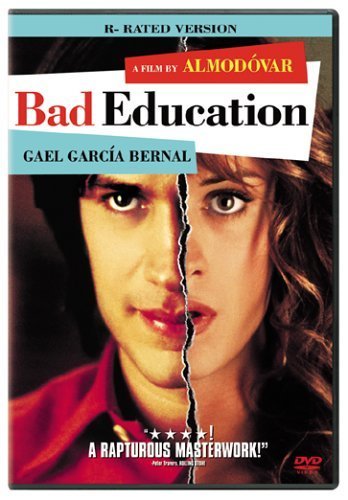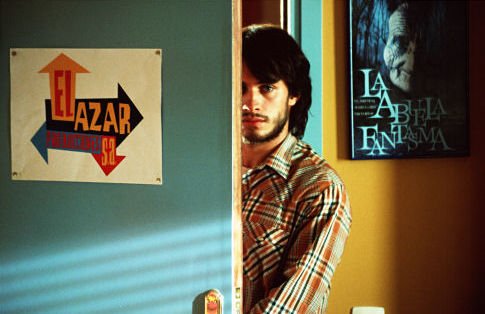
Bad Education, the 2004 film from Spanish director Pedro Almodóvar, ranks among my top 5 favourite films ever. I remember going to the Kentucky Theatre in Lexington KY to see this film, which had a NC-17 rating in the States despite no actual nudity in the film. It was the first Almodóvar film I saw in a cinema, and the second I saw overall. This film converted me into an aficionado of the director. I have seen every one of his films since at the cinema.
While many of Almodóvar’s fans say it’s one of his lesser films, for me, it’s his best film. Granted, I am a fan of film noir, and the last twenty minutes read like a checklist of film noir moments. It’s his most complex film to date, using flashbacks, flashforwards, and a story within a story that is the real story, or not, to tell this harrowing tale of the Catholic Church’s child abuse during the Franco era.
Fele Martínez is Enrique Goded, a young Spanish film director in 1980 whose office could pass for Almodóvar’s office, complete with vibrant colours, fake movie posters (La abuela fantasma was the original name for Volver, and that poster looks like Los amantes pasajeros. El Azar is very similar to El Deseo, Almodóvar’s production company). Enrique is surprised to receive an unwelcome visit from an old school chum, Ignacio (Gael García Bernal), who now goes by the name Ángel. Ángel leaves Enrique with a short story he has written based on the events surrounding their experience at a Catholic primary school, including the sexual abuse from the priest.
Enrique is intrigued by the story, which unfolds on screen, and decides to make a film with Ángel as the star. Enrique investigates Ángel to find out the truth what happened to Ignacio. The movie jumps around in time, from fiction within the fiction, using a ton of film noir motifs, and it’s easy to get confused what’s real and what’s not without paying close attention. As usual, I won’t spoil the ending, but Gael García Bernal, one of my favourite actors, pulls off the complex role effortlessly.
Almodóvar pulls off an incredible story that is incredibly personal. He worked on the script for over ten years. Despite not having any of his usual strong female actresses, the film is classic Almodóvar. Ángel is the perfect femme fatale.
 Despite being his best, in my humble opinion, I do recommend being familiar with the director’s work and with the film noir genre before tackling this film, or else viewers could be easily lost and give up on this challenging film. It involves sexual abuse of children (not explicit) and gay sex (somewhat explicit), drugs, transsexuals and the usual collection of Almodóvar’s misfits. That said, it’s his strongest work and, for me, one of the best films ever made.
Despite being his best, in my humble opinion, I do recommend being familiar with the director’s work and with the film noir genre before tackling this film, or else viewers could be easily lost and give up on this challenging film. It involves sexual abuse of children (not explicit) and gay sex (somewhat explicit), drugs, transsexuals and the usual collection of Almodóvar’s misfits. That said, it’s his strongest work and, for me, one of the best films ever made.
Rating: A
Almodóvar Checklist:
Chicas Almodóvar: The only Almodóvar not to feature any of his amazing actresses.
Antonio Banderas: No.
Poisoned Gazpacho: No
Madrid: Sí
Galicia: Sí
Drugs: Sí
Musical Sequence: Quízas, Quizás, Quizás…gracias, Zahara (Gael García Bernal), Ignacio as a child sings “Moon River” in Spanish, Child Ignacio sings to the priests at a dinner. Ángel watches a drag queen sing.
Men Too Gay To Function: Every single character.
Transvestites: Yes. Javier Cámera is a poor man’s Agrado (even says “auténtico”), Gael makes a splendid Zahara, and then Ignacio.
Surreal rape scene: The abuse takes place off screen, thankfully.
Furniture Ikea Could Never Market: Enrique’s office could be Almodóvar’s.
Meta Slow Camera Pan To Show How Much He Really Loves Cinema: Sí
Mirror Scene: Sí. When Zahara sleeps with Enrique in the story.
Aspect of Spanish Culture Turned On Its Head: The power of the Catholic church during the years of Franco, gays as femme fatales, attacking the Catholic church in general.
Dress from Lady Gaga’s rejected pile: Sí.
Catholic Church As Bad Guy: SÍ QUE SÍ.
Taxi: Sí.
His mother: No.
Reference to earlier film: Oddly enough, there is a poster that appears to be from Almodóvar’s 2013 film Los amantes pasajeros. Enrique’s office is pretty much an homage to Almodóvar’s career.
Odd Advertisement: No.
~~~
La mala educación, una película de 2004 de director español Pedro Almodóvar, es una de mis películas preferidas. Recuerdo que fui al Kentucky Theatre, un cine en Lexington, Kentucky, para ver la película, que tenía una clasificación de NC-17 (solo mayores de 17 permitidos) en los EEUU a pesar de no tener ningún desnudo en la película. Era la primera película de Almodóvar que vi en el cine, y la segunda película del director que vi. Me convertí a un fan del director. Desde entonces, he visto todas sus películas en el cine.
Aunque muchos de los fans de Almodóvar dicen que es una de sus peores películas, para mi, es su mejor film. Vale, soy aficionado de cine negro (film noir), y los últimos 20 minutos de la película son como una lista de los elementos de film noir. Es su película más compleja hasta ahora, y usa mucho flashback, flash-forward y una historia dentro de la historia que es la historia real, o no, para contar esa historia horrosa de la Iglesia Católica y su acoso sexual de niños durante la epóca de Franco.
Enrique Goded (Fele Martínez) es un joven director español de cine en 1980, y su despacho puede ser el despacho de Almodóvar, completo con colores vibrantes, carteles de cine falsos (La abuela fantasma era el nombre original de Volver, y hay un cartel que es parecido al cartel deLos amantes pasajeros. El Azar es muy parecido a El Deseo, la compañía de producción de Almodóvar). Enrique no está muy contento recibir una visita inesperada de un antiguo compañero de colegio, Ignacio (Gael García Bernal). Ignacio ahora usa el nombre “Ángel”. Ángel deja con Enrique un relato que ha escrito Ángel sobre los eventos de su juventud en el colegio de primaria católico sobre el acoso sexual del cura.
Le da intriga la historia a Enrique, que desarolla en la pantalla, y decide grabar una película con Ángel como protagonista. Enrique investiga a Ángel para averiguar la verdad a lo que pasó a Ignacio. La película juega con el tiempo, de la ficción dentro de la ficción, usando los elementos de cine negro, y es fácil confundirse con lo es la verdad y lo que no es la verdad si no prestas mucha antención. Como siempre, no voy a dar spoilers del final, pero Gael García Bernal, uno de mis actores preferidos, hace el papel sin esfuerzo y lo hace genial.
Almodóvar nos cuenta una historia increíble que también es muy personal para él. Trabajaba en el guion durante unos 10 años. A pesar de no tener sus actrices fuertes de siempre, la película es Almodóvar clásico y Ángel es el femme fatal perfecto.
Aunque en mi opinion es su mejor película, os recomiendo que es mejor saber algo del director y de los elementos de cine negro antes de ver esta película, o será muy fácil perderse durante la película. Trata de abuso sexual de niños (no explicito) y sexo homosexual (explicito), drogas, transexuales, y la colección normal de personajes de Almodóvar. Para mi, es su obra más fuerte y también una de las mejores películas de historia.
Rating: A
This piece first appeared on Pablo’s setmeravelles.com.
[box type=”bio”]
 PAUL ALLEN HAKER, Pablo to his friends, is a thirtysomething English teacher and writer who lives in Bilbao in the Basque Country in northern Spain. Constantly searching for deeper meaning in life, Pablo spends most of his money on travelling and learning languages (he speaks English, Spanish, Catalan, Italian, and is currently trying his hand at Basque). When he’s not teaching, at the gym, travelling or watching films, he can be found working on his novel or reading at a café. Keep up with his travels and writing at SetMeravelles.com.
PAUL ALLEN HAKER, Pablo to his friends, is a thirtysomething English teacher and writer who lives in Bilbao in the Basque Country in northern Spain. Constantly searching for deeper meaning in life, Pablo spends most of his money on travelling and learning languages (he speaks English, Spanish, Catalan, Italian, and is currently trying his hand at Basque). When he’s not teaching, at the gym, travelling or watching films, he can be found working on his novel or reading at a café. Keep up with his travels and writing at SetMeravelles.com.
[/box]



